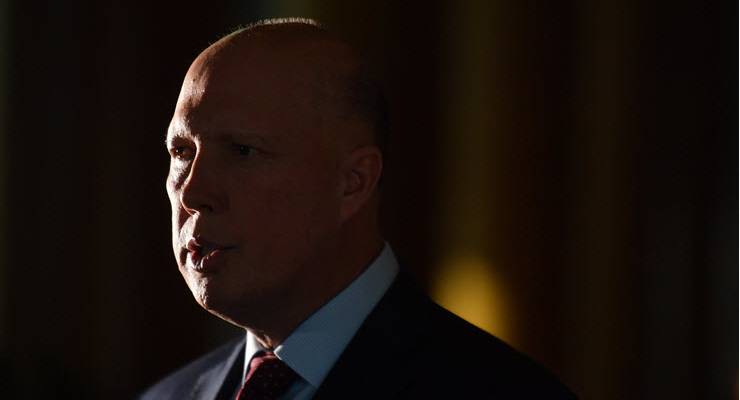
Today, the government will introduce new laws which will dramatically increase the power of national security agencies.
Ostensibly designed to stop the scourge of bad guys like terrorists, paedophiles and drug-traffickers, the bill will allow security agencies to take over the accounts of suspected criminals on the dark web, as well as modify and disrupt their data.
It all sounds very scary. But are the laws, which ramp up what ASIO and friends can do, really necessary?
Well, Home Affairs Minister Peter Dutton obviously thinks so, telling media in typically baroque terms that the new laws would allow the agencies to “shine a light into the darkest recesses of the online world and hold those hiding there to account”.
But the latest laws come after years of the government dramatically escalating the powers of cops and national security agencies, with largely bipartisan support. That’s best exemplified by a broad-ranging bill expanding powers to allow agencies to access encrypted messages, hurried through parliament two years ago despite serious reservations from tech experts.
And there now seems to be some recognition that our national security laws give agencies perhaps a little too much leeway to access information like metadata.
In fact, a recent review into Australia’s data retention regime by the Parliamentary Joint Committee on Intelligence and Security (PJCIS) found the current threshold for when security services could access metadata was too low.
Currently, laws allow agencies to get access to historic data without a warrant for things as benign as enforcing a parking ticket. The committee recommended the laws be tightened so officers can only access information when investigating a serious offence (defined here), or one punishable by three or more years in prison.
Responding to submissions made by telecommunications companies, the committee found that in effect, sections of existing legislation operated as a loophole, allowing bodies like local councils and the RSPCA to get access to phone data. The committee also recommended Home Affairs creates national guidelines for data retention to make everything more clear.
And remember, this isn’t the work of some bleeding heart leftie body — the PJCIS is a Liberal-majority committee, chaired by former SAS member-turned-China critic Andrew Hastie, and including people like Eric Abetz and Amanda Stoker in its ranks.
Labor members of the committee went further, arguing the recommendations should do more to balance law enforcement interests with privacy.
In recent years, the balance has been comprehensively tipped in favour of the former. In that context, it’s unclear whether we need more laws giving spooks more power to do more stuff.
Until the laws are tabled later today, we don’t know for certain what the threshold will be for security agencies to hack a person’s laptop — although the warrants will have to be signed off by a judge or Administrative Appeals Tribunal member.
The government says if they had the new powers in place, they could have stopped potential terror threats earlier. But we don’t know for sure whether they’ll actually be used just for stopping bad guys, or become another weapon in the security-establishment’s long-running war on public interest journalism, for example.
So far, we’ve only got Dutton’s word for it.








I have no confidence in the word of a man who acts with cruelty towards the most vulnerable in our world
A warrant will have to be signed off by an AAT member? Weren’t most of these appointed by our’ first law officer’, Attorney General Porter.
So now some Liberal party lackey at the AAT (not a judge) will get to approve the feds hacking into your system (work or personal) and changing data (plant evidence of criminal activity or remove evidence if innocence).
What could go wrong ? given once you’re charged with any crime they can seize your electronic equipment and make it very hard for you to prove they modified your system or hide their changes. Computer forensics is a very difficult and expensive process and they’re basically pricing you out of justice as soon as they slap a secrecy order on the evidence.
Hard to see we can take the moral high ground with China when our dictatorship will be able to criminalise anyone they want under the guise of pedophilia or terrorism. I guarantee if this goes ahead it will end up even worse than the NSA domestic spying debacle and if misused used for political purposes this is the end of our democracy as we know it.
Australian double standards continue. Calling other countries “Authoritarian” while changing the laws to enable ever deeper surveillance and control of it’s own citizens.
Dutton a man without a cause.
Who locks up a family of four to show his own strength.
And plays God with people who just wanted a better life.
Morrison is an incompetent fool but it could have been worst.